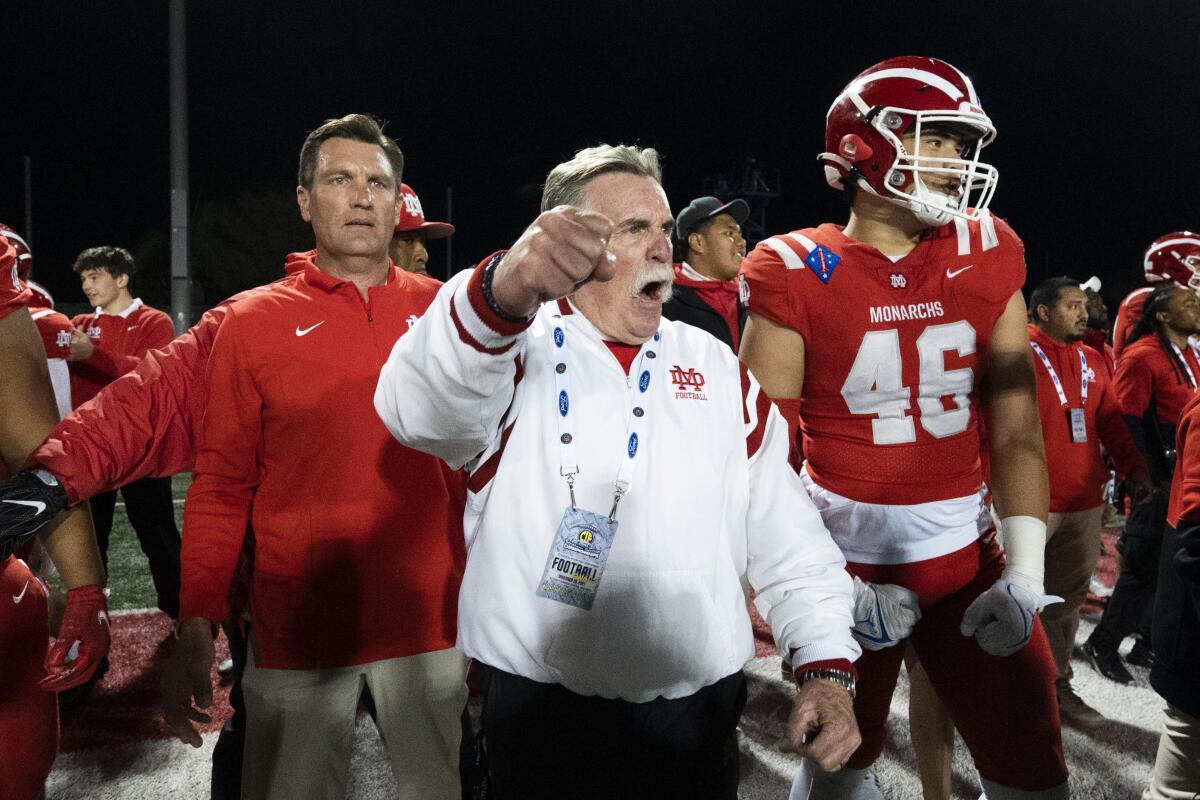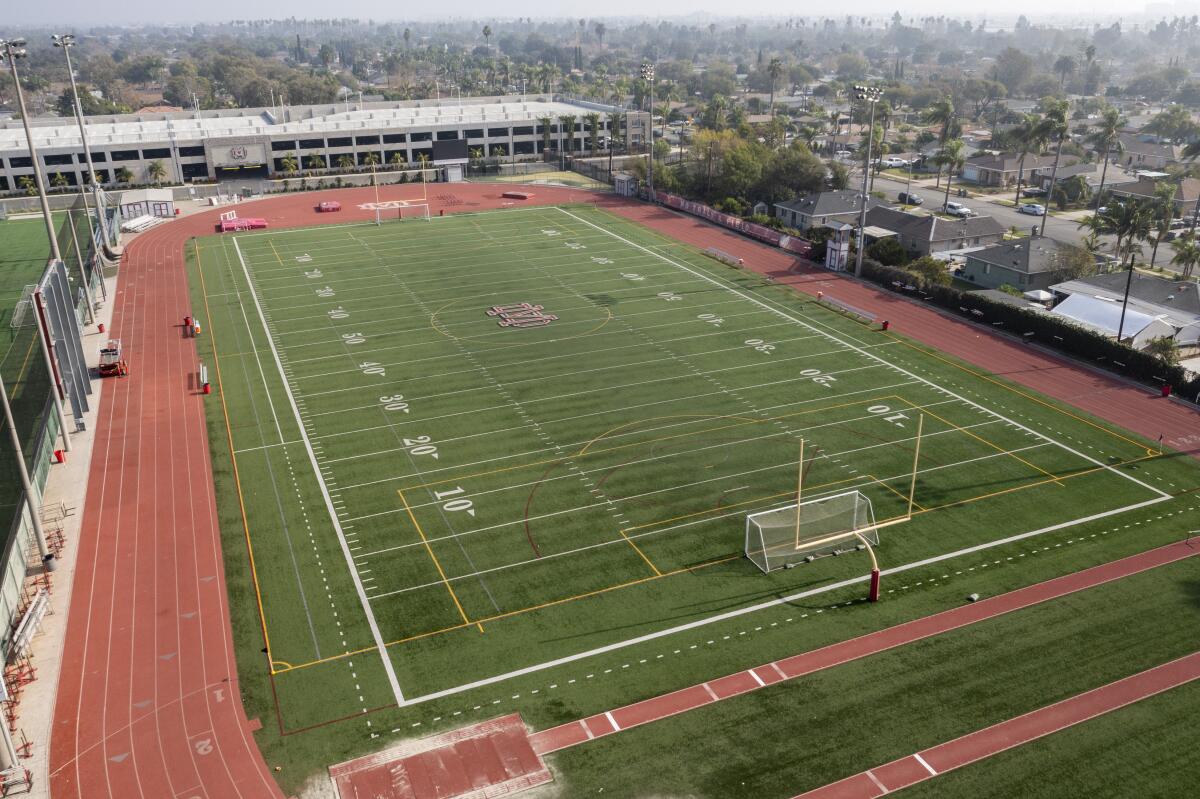Column: ‘Why does Mater Dei protect bullies?’ A school and Orange County diocese have lots to answer for

- Share via
A high school student gets assaulted. Their innocence is shattered; their life, forever changed.
School officials learn about the incident. They do worse than nothing; they cover it up, and even laugh about the matter. Their superiors look the other way. The enablers and abusers get protected; the survivor gets ostracized. And when critics cry foul, the institution plays the victim card.
Just another day at Mater Dei High School, the crown jewel of Catholic education in the Diocese of Orange.
Its powerhouse football team is making national news right now, and not just because the Monarchs are on the cusp of claiming their fourth national championship in five seasons. A lawsuit filed last month against Mater Dei and the Roman Catholic Diocese of Orange says a former football player suffered a broken nose, a traumatic brain injury and permanent scarring in a February hazing ritual called “Bodies” that amounted to a school-sanctioned beat down.

The lawsuit says the team’s adult staff did nothing to stop the victim’s assault by a much larger player, initially ignored his injuries and lied to Santa Ana police when they investigated the incident. It also alleges that when the boy’s father confronted head football coach Bruce Rollinson about what happened to his son, the prep sports legend cracked, “If I had a hundred dollars for every time these kids played Bodies … I’d be a millionaire.”
The victim transferred to another school but soon found out that he couldn’t immediately participate in sports because Mater Dei officials put a disciplinary mark on his transfer papers. Meanwhile, Rollinson — who was charged in 1989 with choking a female athletic trainer in front of students and eventually pleaded no contest to disturbing the peace over his actions after a trial ended in a hung jury — is preparing his team to play next week for the California state football championship.
Mater Dei High’s elite football program is home to a culture of hazing that led to a player’s traumatic brain injury, according to a lawsuit filed Tuesday.
The allegations have disgusted the sports world, especially since it seems there’s a high chance there won’t be any disciplinary action whatsoever against the Monarchs. Mater Dei President Walter E. Jenkins just released a letter that basically said the school’s moving on but promises to do better in the future; Diocese of Orange Bishop Kevin Vann hasn’t uttered a word. Through a spokesperson — a Mater Dei graduate, no less — both declined further comment because of the “pending civil action and the involvement of minors.”
The Orange County district attorney’s office declined to file criminal charges against the alleged assailant even though a Santa Ana police investigator recommended charging the unnamed student with felony battery. Even the California Interscholastic Federation, which governs high school sports in the state, said it wouldn’t sanction Mater Dei for what happened, arguing it had no jurisdiction over the school — never mind that Mater Dei is playing in a CIF title game Dec. 11.

To those left incredulous by all this, I say: Forget it, Jake. It’s Mater Dei.
I covered the school for years in my previous job, focusing on the many sex-abuse civil cases that originated from the school. We’re talking about easily more than a dozen known multimillion-dollar sex-abuse settlements since 2002 involving at least 10 accused Mater Dei former employees — counselors, teachers, staff, administrators and more — with next to no discipline for anyone involved.
The latest incident is not a sex-abuse case, but it bears one hallmark of how the Orange diocese has dealt with controversy involving minors at Mater Dei: institutional silence and obfuscation.
Take the case of former Principal Michael Harris. Multiple male students alleged that he repeatedly assaulted them in his office through the 1970s and 1980s before he left to open Santa Margarita High, where Harris later resigned in the wake of more accusations that the Orange diocese kept secret for years. Harris was never convicted of any crimes, but he alone has already cost the Orange diocese more than $7 million in sex-abuse settlements — and another former Mater Dei student has a pending lawsuit that names Harris as their abuser.
The Orange diocese also stayed quiet in 1989, when Mater Dei officials allowed then-choir director Thomas Hodgman to quietly resign after he had admitted to sexually abusing a female student. Then-Principal John Weling said nothing to parents at the time but did joke to diocesan officials in a memo that “there is never a dull moment at [Mater Dei]!”
The same silence happened again in the mid-1990s with Jeff Andrade, an assistant boy’s basketball coach that Mater Dei administrators suspected of inappropriate relations with female students. When they interrogated Andrade about such rumors, legendary head coach Gary McKnight burst into the meeting and told Andrade to lawyer up and not say anything else until one arrived.
Mater Dei ended up firing Andrade, who was never convicted of a crime even though he admitted in a deposition to having sex with an underage student. Years later, both he and then-Mater Dei school President Patrick Murphy said during depositions that Andrade returned to campus to help run fundraisers for athletic teams with the blessing of McKnight, who continues to coach at Mater Dei.
None of the above was ever volunteered by Mater Dei or the Orange diocese; they only came to light via lawsuits and the media.
In 2007, current Principal Frances Clare did tell parents in a letter after yet another batch of sex-abuse lawsuits that the school had “informed and cooperated with the legal authorities in an appropriate manner” about two alleged abusers back in the 1990s. But when I called up the Children and Family Services Division of Orange County’s Social Services Agency back then — which mandatory reporters are supposed to contact whenever they find out about child abuse — they said they had no record of any talks with Mater Dei.
Student abuse at Mater Dei isn’t a few rogue individuals over the decades; it’s institutional. And no one knows this better than John Manly, who has repeatedly sued his alma mater on behalf of clients over alleged sexual abuse by adults and currently has “multiple” pending lawsuits against Mater Dei. He’s always made it a point that any sex-abuse settlements he enters with Catholic diocese involve the release of depositions and documents that show what actually happened versus what prelates claimed happened.
“The funny thing about this is that everyone expects them to do something about this,” he said about the scandal currently roiling Mater De football. “But they didn’t do anything about child rape. Do they really think they’re going to do anything about hazing?”
For a minute, I thought they would.
I really thought Bishop Vann had changed the Orange diocese, which has ultimate jurisdiction over Mater Dei, for the better. His predecessor, Bishop Tod D. Brown, presided over a diocese that was just as bad as the archdioceses of Los Angeles and Boston when it came to protecting pedophile priests and ignoring their victims.
Fortunately, Orange County Catholics haven’t seen that with Vann. But it’s a failure of accountability if he allows Mater Dei football to get off scot-free in this case.
For his part, Manly doesn’t think anything will happen to Rollinson, his former sophomore history teacher.
“If you’re a winner, that’s all that matters,” he said. “The thinking is, ‘We’re going to protect the organization, we’re going to protect the money machine.’ If one kid gets violently assaulted, they just don’t care.”
But what really angers Manly about the current hazing case is how Mater Dei has let the Monarchs football team continue to play — and let Rollinson coach — as if nothing is going on.
“Why does Mater Dei protect bullies?” Manly asked. “That young man who hurt the student, what has he learned? ‘Might makes right.’ That you can get away with anything.”
More to Read
Sign up for Essential California
The most important California stories and recommendations in your inbox every morning.
You may occasionally receive promotional content from the Los Angeles Times.












